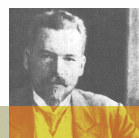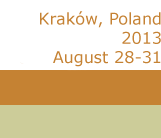


| about... | | | organizers | | | programme | | | register | | | home |
|
The Marian Smoluchowski Symposium on Statistical Physics is a cyclic scientific meeting organized annually in Poland since 1988. The conference takes name after the famous Polish physicist who made huge contributions in the natural science and foundation of statistical physics. Links to the most important scientific works by Marian Smoluchowski are available here. The conference is traditionally organized under the patronage of the Mark Kac Complex Systems Research Center at the Jagiellonian University in Krakow and the consortium of four other Polish academic institutions, i.e. the Institute of Chemical Physics, Polish Academy of Science (Warszawa), Silesian University of Technology (Gliwice), August Chekowski Institue of Physics, Silesian University (Katowice) and Wrocaw University of Technology. European Science Foundation was involved in preparation and co-sponsoring of the symposium in the past within the program STOCHDYN (Stochastic Dynamics) and EPSD (Exploring Physics of Small Devices). In 2012 the anniversary XXVth Smoluchowski Symposium has been organized and promoted with the assistance of the Division of Statistical and Nonlinear Physics (SNP), a part of the European Physical Society (EPS). The XXVIth conference, devoted to the complexity of brain will take place in Krakow, Poland in Collegium Maius of the Jagiellonian University, 28-31 August 2013. The program of the meeting will focus on various aspects and principles of brain structure and functioning, understanding modular character of its components and synchronization, modeling brain activity, behavior and cognition. Participation of experts involved in computational neuroscience and neurophysiology is expected to shed light on recent evidence of critical phenomena observed in human brain dynamics at various spatial and temporal scales. The subject of the conference will also cover the issue of neural information gain, transfer and processing. Decoding of brain signals allows to extract features from the preprocessed brain signals which are further classified to represent different mental states. An inverse mapping should provide relation between brain signals and specific stimuli. Hierarchical structure of cortical connectivity will be discussed in the context of characterization of complex networks. The broad scope of the conference is meant to attract international community of neuroscientists to share their opinions and possibly, creating a new platform for common research. |
| Speakers |
||
| Ttitles and Abstracts |
||
| Fees |
||
| Deadlines |
||
| Participants |
||
| Proceedings |
||
| Location & lodging |
||
| Poster |
||
| Important! |
||
| Contact |
||